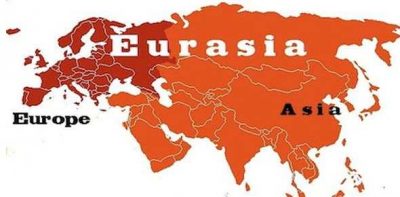North Atlantic vs. Eurasia: EU Admits that “American-led System” Nears Its End

First published in May 2020
European Union foreign affairs chief Josep Borrell told a gathering of German ambassadors on Monday that “analysts have long talked about the end of an American-led system and the arrival of an Asian century. This is now happening in front of our eyes.” He said that the coronavirus pandemic could be the catalyst to shift power from West to East and that “pressure to choose sides is growing” for the EU, before adding that the 27-nation bloc “should follow our own interests and values and avoid being instrumentalised by one or the other.”
Borrell said “we only have a chance if we deal with China with collective discipline,” noting that an upcoming EU-China summit this autumn could be an opportunity to do so. “We need a more robust strategy for China, which also requires better relations with the rest of democratic Asia.”
As China, India, Japan, Indonesia and Russia will become some of the world’s biggest economies by 2030, according to Standard Chartered Plc, the 21st century is known as the “Asian Century.” So, the EU has a serious decision to make on whether to continue its hostile approach towards Russia if it wishes to have more straight forward trade access to Asia. Putin has made incentives for colonists to populate the Far East of Russia to boost its small population of under seven million people who live close to China to fully and better engage in the “Asian Century.”
European trade with Asia could be done through the Russian Far East port of Vladivostok and the Trans-Siberian transportation routes, and this would also bypass China’s Belt and Road Initiative. Macron last year made a Facebook post where he said “progress on many political and economic issues is evident, for we’re trying to develop Franco-Russian relations. I’m convinced that, in this multilateral restructuring, we must develop a security and trust architecture between the European Union and Russia.” With Macron emphasizing a European-Russian rapprochement, he then expanded on General de Gaulle’s famous quote that Europe stretches “from Lisbon to the Urals,” by saying that Europe reaches Vladivostok which is near the Chinese and North Korean border.
According to experts China’s foreign investment in the advanced development zone accounts for about 59.1% of all foreign investments in the region. The Russian Far East has a huge investment potential, especially with materials, natural resources, fisheries, and tourism, and China aims to take advantage of the mostly underdeveloped region. The region is not only resource rich, but is strategically located as it borders China, Mongolia and North Korea, and has a maritime border with Japan.
With France’s recognition of Vladivostok and Borrell now acknowledging that the power centers of the world are shifting to the East, the EU has little choice but to make a rapprochement with Russia and end its sanctions regime. In addition, it would be in the EU’s interests not to engage in anti-China actions on behalf of the U.S.
China’s handling of the coronavirus pandemic has meant that it has not only recovered and restarted its economy, but that it engages in large-scale soft power projections by delivering tons upon tons of medical aid to every region in the world and has sent doctors and nurses to the most affected countries. This comes as the U.S. is approaching 2 million cases of coronavirus and over 100,000 deaths. Earlier this month, the unemployment rate in the U.S. reached 14.7% with the Federal Reserve estimating it could reach a high of 25%. Pre-coronavirus data found that 29.9% of Americans live close to poverty while 5.3% of the population live in deep poverty and 11.1% of American households, were food insecure, meaning they had difficulty providing enough food for all people within the house. Despite the growing social and domestic problems in the U.S., it is unlikely that Washington will give up its global hegemony so easily.
But Borrell seems to have little confidence that the U.S. will maintain its global leadership and is now eyeing China and the East as the EU’s new main trading partner. Effectively, as the Anglo World attempts to maintain the Atlanticist dominance, the EU is recognizing that its future lies with Eurasia.
*
Note to readers: please click the share buttons above or below. Forward this article to your email lists. Crosspost on your blog site, internet forums. etc.
This article was originally published on InfoBrics.
Paul Antonopoulos is an independent geopolitical analyst.
Featured image is from InfoBrics

